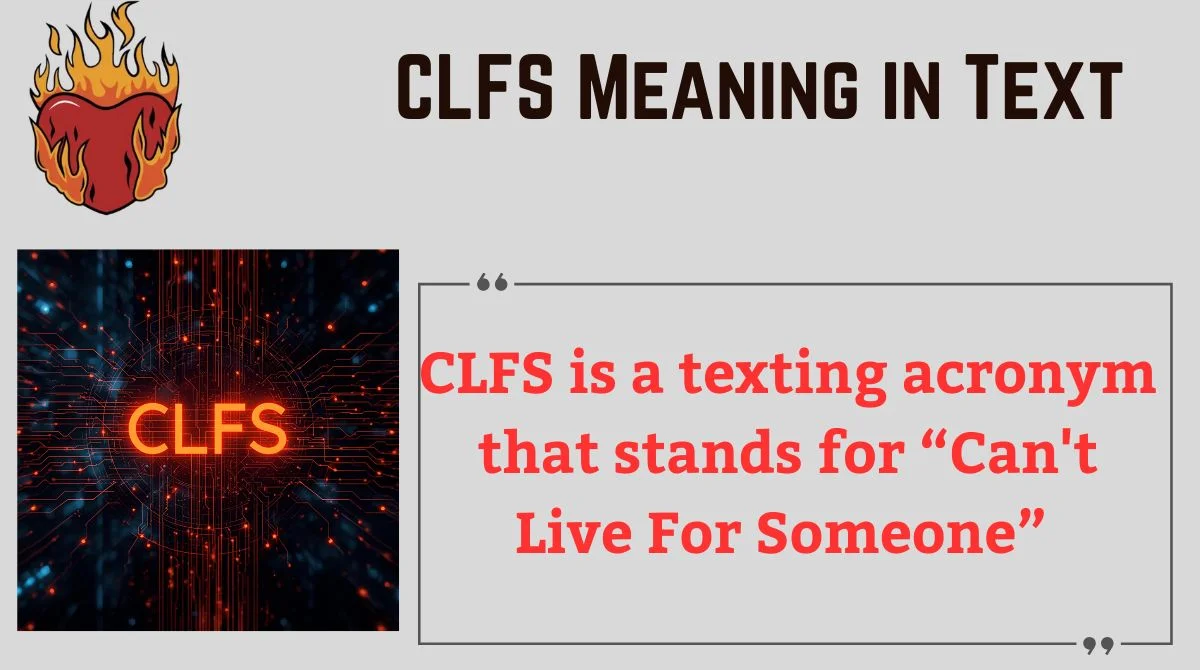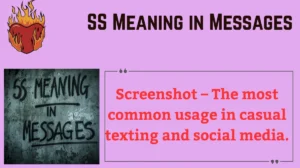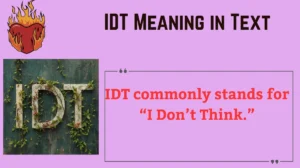Texting has revolutionized the way we communicate. With the rise of abbreviations, acronyms, and slang, keeping up with modern messaging can feel like learning a new language.
One such term that’s gaining traction is CLFS. But what does it actually mean? How is it used? And should you use it in professional communication?
This guide covers everything you need to know about CLFS meaning in text, its origins, proper usage, misconceptions, and more.
Definition & Meaning
CLFS is a texting acronym that stands for “Can’t Live For Someone” in most casual contexts. However, some online communities interpret it differently based on tone, platform, and context.
Key Points About CLFS:
- Primary meaning: Refers to a humorous or dramatic way of saying “I can’t live without someone” or “I really like you.”
- Alternative uses: Occasionally, people use it sarcastically or ironically.
- Tone matters: Texting tone, emojis, and platform can change the implied meaning.
Example in text conversation:
Friend 1: “I just tried the new chocolate cake from that café 😍”
Friend 2: “CLFS, I need it now!”
In this example, CLFS expresses urgency and desire in a fun, casual way.
Origin & Background
CLFS is a relatively recent acronym in the world of texting slang. Here’s a brief breakdown:
- Emergence: First popularized on social media platforms like TikTok, Instagram, and Discord in the late 2010s.
- Community adoption: Young users and meme communities embraced it for dramatic or humorous effect.
- Evolution: Initially, it was strictly romantic, but now it’s used for anything people feel strongly about, like food, shows, or hobbies.
Interesting Fact: CLFS is part of a broader trend of four-letter texting acronyms that convey emotions quickly, like FOMO (Fear of Missing Out) or SMH (Shaking My Head).
Usage in Various Contexts
Understanding CLFS meaning in text requires looking at different contexts where it’s used.
Casual Texting
CLFS is most common in casual conversations between friends or peers. It’s often paired with emojis to enhance emotional expression.
- Example: “CLFS, your dog is the cutest thing ever 🐶❤️”
Dating Apps
On platforms like Tinder or Bumble, CLFS can communicate flirtation or admiration in a concise way.
- Example: “You just posted a new pic… CLFS, you’re glowing!”
Social Media
Users often comment CLFS under posts to exaggerate excitement, humor, or emotional reactions.
- Example: “That episode ending… CLFS, I didn’t see that coming 😱”
Professional or Semi-Formal Contexts
It’s generally not recommended to use CLFS in formal emails or workplace chats, unless you know your audience well and the context is casual.
Common Misconceptions & Clarifications
Misunderstandings about CLFS are common. Let’s clear them up:
| Misconception | Reality |
|---|---|
| CLFS is offensive | Mostly not; it’s casual and humorous. Context matters. |
| CLFS only refers to romance | Initially yes, but now it applies to food, hobbies, shows, or funny situations. |
| CLFS is universal | Usage can vary by region, platform, and age group. |
Tip: Always consider tone, emojis, and context before using CLFS to avoid confusion.
Similar Terms & Alternatives
CLFS isn’t the only acronym expressing strong feelings. Here are some similar terms:
- ILY – I Love You
- ILYSM – I Love You So Much
- CLWY – Can’t Live Without You
- OMG – Oh My God (for excitement)
When to use alternatives:
If CLFS feels too casual or your audience may not understand it, ILY or CLWY can work as substitutes.
How to Respond When You Receive CLFS
Knowing how to respond helps avoid awkwardness in conversation. Here are some practical approaches:
- Casual response: “Haha, same here!”
- Flirty response: “CLFS? Guess we’re soulmates 😏”
- Neutral response: “Got it! Sounds serious 😅”
Quick Tip:
Match the tone of the original message. If it’s playful, respond playfully. If it’s romantic, be mindful of your reply.
Regional or Cultural Differences
Texting slang often varies by region. CLFS is more common among:
- North America & Europe: Casual, humorous usage in social media and chats.
- Asia: Younger audiences use it mostly in gaming or meme communities.
- Latin America: Occasionally used, but other abbreviations like TQM (Te Quiero Mucho) may be preferred.
Cultural awareness is key. Misinterpretation can happen if the reader isn’t familiar with the acronym.
Hidden or Offensive Meanings
While CLFS meaning in text is generally harmless, some users may twist it sarcastically or aggressively:
- Irony: Using CLFS in a mocking tone.
- Exaggeration: Over-dramatizing a trivial matter.
- Rare offensive use: Could imply obsession or clinginess in extreme contexts.
Pro tip: If unsure, combine CLFS with emojis to clarify tone and intent.
Suitability for Professional Communication
CLFS in the workplace? Usually a no-go unless the team is casual and digital-savvy.
- Pros: Can create rapport in informal messaging apps (Slack, Teams) if everyone understands it.
- Cons: May appear unprofessional or confusing to colleagues unfamiliar with texting slang.
Recommendation: Use alternatives like “Really excited about this!” or “Can’t wait!” in professional settings.
Comparison with Similar Acronyms
| Acronym | Meaning | Tone | Best Use Case |
|---|---|---|---|
| CLFS | Can’t Live For Someone | Playful, dramatic | Casual texting, dating apps |
| CLWY | Can’t Live Without You | Romantic, sincere | Dating, close friends |
| ILY | I Love You | Romantic or friendly | Close relationships |
| OMG | Oh My God | Excitement or shock | Social media, casual texts |
This comparison helps you decide which acronym fits best depending on your context and audience.
Usage in Online Communities & Dating Apps
CLFS has seen widespread adoption on:
- TikTok: Popular in captions, duets, and comments.
- Discord: Used in meme channels and casual chats.
- Instagram: Frequent in comment sections to express admiration or excitement.
- Dating apps: Tinder, Bumble, and Hinge users employ CLFS to flirt playfully.
Case Study:
A TikTok video reviewing a trending dessert went viral with the caption:
“CLFS, this dessert is life-changing 🍰😋”
The video gained over 2 million likes, showing how CLFS conveys exaggerated excitement effectively in online communities.
FAQs About CLFS
What does CLFS stand for?
CLFS usually means “Can’t Live For Someone”, expressing strong affection or excitement.
Is CLFS offensive?
No, it’s generally harmless, casual slang. Context and tone determine appropriateness.
Can I use CLFS in professional texts?
It’s best avoided in professional settings unless your workplace is informal and everyone understands it.
Can CLFS refer to things other than people?
Yes! It can describe strong feelings for food, shows, hobbies, or funny situations.
How do I respond if someone texts CLFS?
Match the tone—playful with humor, romantic with affection, or neutral with acknowledgment.
Conclusion
Understanding CLFS meaning in text is essential in today’s fast-paced digital communication. Whether you’re texting friends, chatting on social media, or flirting on dating apps, CLFS can express excitement, admiration, or affection in a concise and playful way.
Key Takeaways:
- CLFS is mostly casual and humorous.
- Context, tone, and emojis affect its meaning.
- Avoid using it in professional or unfamiliar settings.
- Alternatives like ILY or CLWY work when clarity or professionalism is needed.
Using CLFS correctly can make your digital conversations more fun, expressive, and relatable. So next time you see it, you’ll know exactly how to react—and maybe even use it yourself!

Mark Peter is the creative mind behind RizzleLineLove.com, your go-to hub for witty, flirty, and downright hilarious pick-up lines. With a passion for blending humor and charm, Mark crafts content that sparks conversations, breaks the ice, and adds a playful twist to everyday moments.
Whether you’re looking to impress your crush, make your friends laugh, or spice up your social media captions, his work is all about helping you connect — one clever line at a time.



